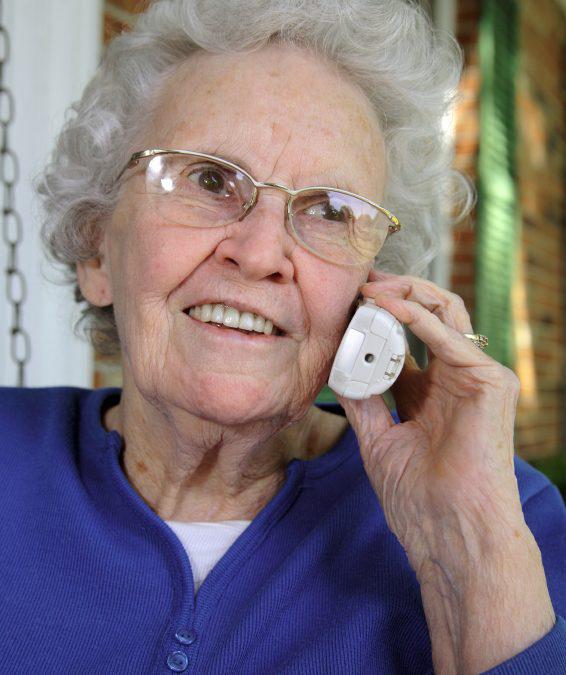This is a case that really happened as I report it.
A 93 year old grandma played all kinds of sweepstakes and got mailings from them regularly. She loved the excitement of entering contests. She got a letter from one of them, informing her that she had won a huge cash prize. Shortly after, she got a phone call congratulating her on her win. She was so excited. She called her son and reported that she was going to get a million dollars! All she had to do was go to the bank with the lawyer for the sweepstakes company and withdraw the tax on her winnings and he would then give her a check for her prize. The bank was across the street from her assisted living home and he was coming next Monday. She could hardly wait.
Her son, Vince, called AgingParents.com, in a bit of a panic. He got the news from his 93 year old mother on a Friday and he had an obligation taking him away for the weekend. He would be back late Sunday night. He thought this story was a scam and he wanted to stop his mother from taking a stranger to her bank Monday morning. I assured him that it was indeed a scam, and that no legitimate company requires that a person pay tax on their winnings in order to get them. Taxes are the IRS’s business, not a sweepstakes company’s doings. But how could he stop is mother from this fake “you won” trap? Could he get there in time?
Since the fake “lawyer” for the scammer was coming to his mom’s apartment on the following Monday, I advised Vince that he had to go there first thing in the morning and stay with her all day. He did live reasonably close and was able to show up at 7:00am. His mother showed him the letter saying that she had won the million dollars. While he was in her apartment, he collected a tall stack of papers for sweepstakes, lotto and other contests she had entered, all of which now had her name and contact information. Vince knew that his mom had memory problems at 93 and he understood that she should not be solely in charge of her finances anymore. But he just
just
Vince intercepted a call from the fake sweepstakes lawyer to his mother at 9:00 a.m. that very Monday, confirming that he would arrive at noon. He demanded to know what company this was and what this man thought he was doing with his mom. The scammer made some excuse about being a distant relative and it got ugly. He hung up. Vince then had to tell Mom that it was a fake and she must never give anyone access to her bank or account number. She was very disappointed but she accepted it, because she loved her son and trusted him.
The Follow Up
Vince was the duly appointed successor trustee on his mother’s seven-figure trust, but he had not ever asked her to resign, a step he could have taken long before. I advised him about how to approach her and he did so. Fortunately, she did resign, and the estate attorney completed the transition with the right documents. Now Vince was the trustee over mom’s accounts. He controlled all her funds. That saved his mom from any other predatory sweepstakes or contest scammers. She no longer had access to her bank account. Vince provided a new, monitored credit card with a low limit and monthly cash for her to spend as she had normally done, excluding contest entries.
The Takeaways
Vince narrowly escaped failing to protect his vulnerable mother from losing all her money. Imagine the scammer getting access to the bank account and all her assets in it. He could have cleaned it out in a matter of minutes. Learn from Vince’s mistakes early on that would have stopped this close call.
- Note trouble signs. Even if your aging parent is alert, relatively independent and seems okay, pay attention to the very first signs of trouble brewing and act on them. Elders who love to play the lotto, sweepstakes or other contests are giving out their personal information to every company they contact. Their names , birthdates and information are readily bought and sold and can be used by predators. Multiple sweepstakes and cash prize contest entries for aging parents are a financial safety risk. Don’t let a vulnerable elder like this have free access to all their funds.
- The appointed person must step up. If you are appointed as successor trustee for your aging parent and they are getting even a little forgetful, it’s time to ask them respectfully to resign from the trust or to allow you to exercise your authority to take over. Some will strongly resist, which is another problem. It can be addressed. Others will accept your request readily, as Vince’s mom did. The point is, don’t put it off because it’s uncomfortable.
- When aging parents enter contests, they give out personal data. The entry form will typically ask for their date of birth and address. When that information is sold to just any buyer, your loved one can be identified by age, location and in Vince’s mom’s case, by residence in assisted living. Scammers love to prey on people like her. Some are an easy mark. Some don’t have a son like Vince, who was at least wise enough to smell a rat when his mom said she was going to the bank with someone proclaiming to be a lawyer.
Billions of dollars are stolen from elders every year in the U.S. The sweepstakes scams are just one way, among many. When our aging parents are alert and doing relatively well in their lives, it’s easy to get lulled into that false sense of security. We think we don’t need to upset them by changing anything. But they are aging and changing, sometimes increasing their risks around money. Raising our own consciousness about risks helps. I am sure Vince would tell you how frightening this was and to please act sooner than he did with his mom.
Read the full article here










